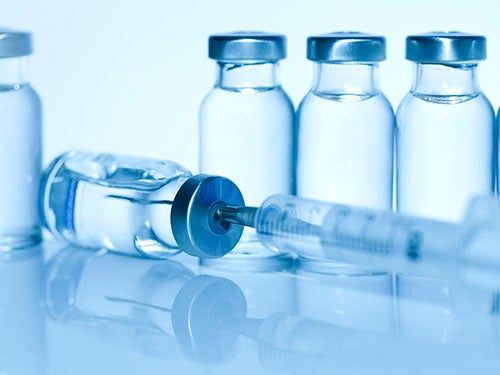Vaccinate With Confidence
February 25, 2021As the COVID-19 vaccine becomes more widely available, it’s important to base your vaccination decision on the most accurate and credible information available. Trinity Health Of New England addresses some of the most common misconceptions related to the vaccine and offers answers to frequently asked questions.
Should people who are pregnant or breastfeeding get the vaccine?
Both the American College of Obstetrics and Gynecology as well as the Society of Maternal and Fetal Medicine have released statements and advocate that women should be allowed to get the vaccine if it is available to them and have the choice on vaccination. “There’s always some hesitation that it’s not just the person, but mom and baby. It’s important for people to talk with their OB/GYN. There’s been no evidence to suggest that there would be any detriment to mom and baby getting vaccinated,” said Dr. Jessica Abrantes-Figueiredo.

Will the vaccines that have been approved work on the new variants?
Dr. Abrantes says it is something that we should be concerned about. “What I typically tell my patients or colleagues is that we don’t need to see variants if we stop the replication of COVID-19. If we stop the spread, we will have to worry less about variants. The studies are ongoing, but most of the vaccines should be effective against most of these variants.”
Are there concerns related to sterilization in women?
No significant safety concerns, including sterilization, have been observed during the Pfizer and Moderna COVID-19 vaccine trials. Additionally, a vaccine cannot be approved without following set safety protocols. Approval cannot happen until at least about two months after the final shot is given during the clinical trial to monitor safety concerns. Trial participants will be monitored for long term side effects for at least two years. “There’s no data to support that it would cause any type of infertility at all. Animal studies are done prior to human studies and we have seen no data to suggest there is infertility. With regards to long-term effects, there is no vaccine that causes infertility issues either,” said Dr. Abrantes.
Is it better to take your chances and just get COVID-19?
While it’s true that most people who have COVID-19 experience mild symptoms and recover, COVID-19 can cause severe health risks and some people still have symptoms for months after they are infected. Also, some early evidence suggests natural immunity may not last long. The COVID-19 vaccine is a safer way to build immunity with fewer health risks.
Were safety protocols bypassed to develop the vaccine so quickly?
Since the start of the pandemic, the federal government, under Operation Warp Speed (OWS), has been working to make a COVID-19 vaccine available as soon as possible. OWS provides federal resources and funding to speed development but maintains strict standards for safety and effectiveness. The timeframe to develop the vaccine was shortened significantly by beginning in mass production before receiving Emergency Use Authorization by the FDA. The clinical studies were not bypassed or shortened said Dr. Abrantes. “For safety, researchers wait at least six to eight weeks after a trial is complete before the FDA reviews for Emergency Use Authorization. If we’re going to see significant side effects, that’s when we catch them. We bring it to millions of people afterwards to see if there’s any other type of adverse reaction that typically can’t be seen until we do mass vaccination across the country.”
Are there concerns that mRNA technology is too new and not proven?
mRNA technology is new, but not unknown. According to the National Institutes of Health, research on mRNA technology began in the early 1990s and has been studied for more than a decade. mRNA vaccines do not contain a live virus and do not carry a risk of causing disease in the vaccinated person. “Studies of mRNA vaccines have been going on for decades. The other thing that has been done with these trials is that multiple facets have been done at the same time. We don’t wait for one phase to go on to the other. Manufacturing was being ramped up while other phases were going on too. These were not small trials. There were tens of thousands of people so there was no skimping with regard to safety. The numbers in the studies are comparable or even larger than that of other vaccines that have been out well before COVID,” said Dr. Abrantes.
Myth: mRNA vaccines change your DNA
The mRNA never enters the nucleus of the cell where DNA is kept. Instead, the cell breaks down and gets rid of the mRNA soon after it is finished using instructions on how to create protein to trigger a response from your immune system. “mRNA is messenger RNA; it gives instructions on how to make a component of the SARS-CoV-2 protein. It enters the cell, but it never enters the cell nucleus. The cell nucleus is where our DNA, our genetic makeup is stored. It doesn’t interact with our DNA,” said Dr. Abrantes.
How do I know which sources of COVID-19 vaccine information are accurate?
It can be difficult to know which sources of information you can trust. Discuss any personal health concerns with your physician and learn more about finding credible vaccine information from the CDC: https://www.cdc.gov/vaccines/vac-gen/evalwebs.htm.
